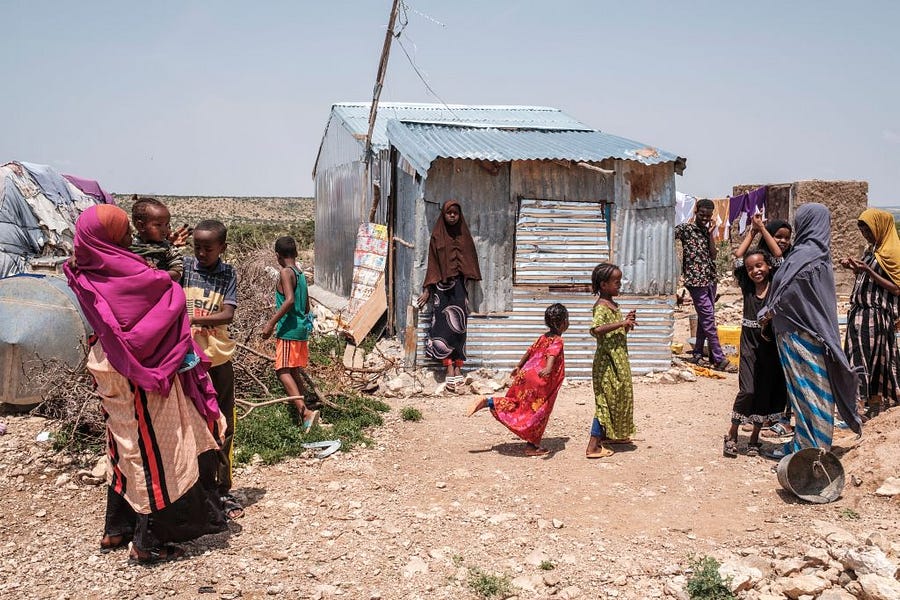Recently, the United Kingdom agreed to pay Rwanda to accept asylum seekers who had originally arrived on Great Britain’s shores. Rwanda would process applications, and those who were granted asylum would be allowed to stay there (but not relocate to the United Kingdom). In addition to financial compensation, the African country would also receive and receive a number of other perks.
The U.K. deal has been controversial and so far not a single asylum seeker has been moved to Rwanda, as the European Court of Human Rights struck down the deal. (The U.K. has so far agreed to remain under the jurisdiction of the ECHR even though it is no longer a member of the EU, although this ruling has led to prominent conservatives calling for this to change.)
Whether the U.K. will ultimately succeed in “outsourcing” its asylum migration is not clear, but this type of bold move will certainly be necessary to handle refugee flows in the future, and its deal can be viewed as a kind of pilot program for how other developed nations can handle the influx.
The world is soon going to face a refugee crisis, not from Ukraine, but from a combination of climate change and the collapse of oil-dependent economies. Climate change will, even under the best of scenarios, render uninhabitable portions of the world that are currently inhabited. The recent floods in Pakistan show how rapidly this can happen. Some degree of climate change is unavoidable, and migration will follow from the areas most affected to those least affected. In other words, from the developing world to the developed world.
The second reason to expect a migration crisis is that many Middle Eastern economies are fundamentally unsustainable, based on a finite resource—oil—that will not be able to prop up their economies forever. While most of these countries are at least trying to transition and diversify their economies, it is proving to be a challenge. Greater numbers of Middle Easterners will seek to leave their countries as economies stagnate or collapse—especially if, as is likely, the end of massive oil revenues were to result in political instability and/or war.
What does this have to do with the United Kingdom and its “outsourcing” of asylum migration to Rwanda? What the U.K. is doing is not, as some critics would say, merely political posturing, meant to satisfy the Conservative party’s immigration-skeptical voters. And the United Kingdom is not the first country to embark on a similar project. Since last year, Denmark has been negotiating with a number of African countries, including Tunisia, Egypt, Eritrea, and Rwanda, the latter of which they have also recently signed an agreement with. For the better part of the last 20 years, Australia has been deporting asylum seekers entering the country illegally (that is, by boat without first having been granted asylum prior to entering the country) to the remote tiny island nation of Nauru where their asylum applications have been processed. Successful applicants who have been deemed to have valid reasons for receiving asylum have then been relocated to Papua New Guinea, another Oceanian nation whom Australia has paid to allow the refugees to settle in.
The truth is, no country is equipped to handle the kind of inflows of asylum seekers that we are likely to see over the coming decades. While migration is a net economic positive, asylum migration has proven costly, especially when volumes have been high, such as during the 2015 refugee crisis in Europe. Whereas immigrant workers generally need to have a job lined up in order to be offered a visa, and are usually required to bring a skill set or qualification that is in short supply and be able to speak the native language of the country they are immigrating to, none of these requirements apply to asylum seekers..
Outsourcing asylum migration to Rwanda (or a similar country) is a cost-saving measure. It is far cheaper to care for large numbers of asylum seekers in Rwanda than it is in the United Kingdom. There is no way that the U.K. or any other country can provide tens of millions of asylum seekers with Western living standards—it is neither politically nor economically feasible.
The alternative would be for these asylum seekers to be settled here in the West, but afforded a far lower living standard than the existing population. In 2015 in Sweden, asylum seekers were housed in tents and in large, unused dormitories at abandoned military bases, as government agencies were unable to find other types of housing at the pace necessary to keep up with the inflow. If the West is unwilling or unable to outsource migration, tent camps and slums will become permanent features on the outskirts of major cities. This would create economic inequality not seen since the Great Depression. Crime and riots would follow as resentment among the migrants grew against the countries that took them in but failed to treat them as they treat their own citizens.
In Sweden, the total net cost for public finances of welcoming a single refugee is $290,000. In the U.S., where the welfare state is smaller and refugees to a greater extent are left to fend for themselves, the cost has been estimated at the relative bargain price of $60,000 for each refugee child and $133,000 for each adult. We have to find cheaper ways of helping refugees in the future, because in the future, there will be a lot more of them.
The other alternative is what most of the world is currently doing: relying on the United Nations and the U.N. High Commissioner for Refugees to house asylum seekers in refugee camps. This is, of course, far cheaper. The UNHCR helps more than 20 million refugees every year, with an annual budget of just more than $9 billion. But sticking people into tent camps does not afford them a chance at a new life, in the sad but common scenario where their home countries do not become safe to return to. Critics who claim that it’s cruel to send refugees to Nauru, Papua New Guinea, or Rwanda fail to understand that most refugees, even those helped by the UNHCR, live under far crueler conditions. Refugees who are relocated to a safe, if not wealthy, country have the chance to rebuild their lives there as they are given a permanent right to stay and work. Refugees in tent camps do not have that luxury.
At least as important as cost, however, is deterrence: This is arguably the key benefit of the Rwanda plan. Being granted asylum is the only realistic ticket of admission to the West for many living in poor regions, as they have no prospects of fulfilling the requirements to get a work visa. These are people who simply (and understandably) want a better life for themselves and their families. But this desire leads them to mix in with actual refugees, people with valid reasons to seek asylum. An infamous case of this involved Afghans who claimed asylum in Sweden, claiming they were fleeing persecution in Afghanistan despite having never actually lived in Afghanistan (Iran has a sizable Afghan minority). Simply being poor is not legally a valid reason to be granted asylum.
Over the next few decades, millions of people will try their luck at getting into the West not because they are facing persecution or war, but because they don’t feel like they have a future in their own countries. This is where countries like Rwanda enter the equation: These countries are perfectly safe. Despite its dark history, Rwanda today has one of the fastest growing economies in the world, and one of the lowest crime rates anywhere in the developing world. People genuinely fearing for their lives— that is, refugees—would prefer to live there or in dozens of other safe, poor countries, rather than remain in the country where they are in danger. Someone who is merely seeking an upgraded standard of living, on the other hand, will prefer to stay put rather than to seek asylum on false premises in a Western country that will subsequently send them to another country where their living standards, while adequate, will not be significantly higher than in the country they came from.
How effective would this be at deterring economic migrants? When used in Australia, the number of “boat people” arriving illegally to the country dropped (though other policies implemented at roughly the same time are a confounding factor). Since the U.K. agreed to the deal with Rwanda, which, again, has not yet seen a single asylum seeker actually sent there, neighboring Ireland has seen a rise in asylum applications, which Irish government officials blame on the deal.
Deterring economic migrants is crucial to preserve the resources necessary to help actual refugees. Relocating and welcoming refugees to Western countries should be a last-resort measure, reserved mainly for cases where refugees are fleeing from nearby areas (for European countries this would mean refugees from Ukraine), with collaboration between developed and developing nations the first and main option. The U.K. model is one to emulate, not one to condemn.






Please note that we at The Dispatch hold ourselves, our work, and our commenters to a higher standard than other places on the internet. We welcome comments that foster genuine debate or discussion—including comments critical of us or our work—but responses that include ad hominem attacks on fellow Dispatch members or are intended to stoke fear and anger may be moderated.
With your membership, you only have the ability to comment on The Morning Dispatch articles. Consider upgrading to join the conversation everywhere.